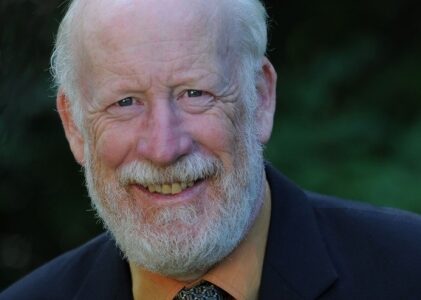Everybody has unused mental space and needs something to put in it
I read three things on the back of a vehicle in Victoria last week: “Free Tibet!” and the Sanskrit symbol “Om.” Then, on the licence plate, “the Best Place on Earth.” I like how these concepts relate.
We live in BC, a long way from China, but it feels good to stand in solidarity with colonized Tibetans ruled by China. Things are so good here – the best, we tell ourselves – we have to look afar for examples of political oppression.
Can we free anyone by displaying a bumper sticker? That’s not the point. We cream the highest and best spiritual traditions of all times, places, cultures, wisdoms. Thus we know that Om is the mantra that masters tell us is the sound the universe makes.
As for our-best-in-the-world Province… BC’s government has just announced it wants our school curricula to stop teaching facts and spend more energy on “big-picture concepts.” I am all for concepts too. Are students’ minds ready for that? Are they so well-acquainted with fact that they are ready for theory?
Canada as part of the Western, rich nations shares in a half-millennium of global dominance over other peoples and an ascent from medieval material privation to the postmodern condition of peace, plenty, and prosperity. What we possess in our economy, our science, our medicine, our democracy, our liberty of choice and freedom for ego, has been the goal of humans for a long time.
We have what in the past people could only dream about, and since the Renaissance, the discovery of the New World, and our Scientific Revolution, two horrific world wars, we have made the dreams for a good life for many into material reality. The developing world in China and India are at last catching up. Though China is colonizing Tibet and Canada bears guilt about its colonial past, we did it for Progress.
An excellent study of “how the West led the Rest” is by Niall Ferguson. His book Civilisation says the West deserves global pre-eminence, and his measure of that is very materialistic, almost Marxian.** But he is not a Marxian scholar at all, rather a defender of Imperialism as practiced by England, France and the USA. A true Marxist, Chris Harman, concludes his history of the world with the advice to the working class that it must become conscious of itself as a class and find leaders to fight capitalism for justice.
I leave that argument aside for another day, but I want to return to the West’s wonderful progress.
I find myself wondering if the freedom and physical security and health and wealth that we wanted and so many in the Western middle class have achieved since around a century ago, is now the foundation for happiness. Material advance and improved lives for our bodies was not an end in itself, I believe. Humans wanted a platform upon which we could ascend to higher non-material, emotional, or spiritual planes, yes? And I look around for evidence that Western citizens are achieving those higher levels.
Did we rise? For argument’s sake, I will say yes, we are more conscious and more spiritually evolved. The evidence for this is by necessity very hard to quantify or measure with exactitude, whereas we can put numbers on Gross National Income. But there are academics trying hard to measure “happiness” and there are very large numbers of affluent and educated Westerners writing, speaking, recording, blogging and internet-working, on the subject of our consciousness and spiritual advancement. It is an industry, this phenomenon of teaching “higher-consciousness spirituality” for fees, worth billions in rich nations.
(If readers are looking for writers on the subject of how consciousness has emerged, whether it is more advanced now than in the past, I recommend these names: W. I. Thompson; Ken Wilber; Don Beck; Jean Gebser; T. de Chardin; D. Dennett; R. Wright; B. Marx Hubbard; Sri Aurobindo; B. Swimme; J. Rifkin.)
One might make the obvious point that if humanity has risen from the primordial state of nature as mere animals like others we evolved from, that, — from the horror of Assyrian and Roman cruelties such as mass exterminations of conquered people, slavery, crucifixion — we would not have had recent wars in which tens of millions died. Famines such as happened in Ireland 150 years would not have been allowed by governments of the West, nor plagues such as kill millions in Africa. Where is the progress?
I’m able to accept that the 20th century’s heinous wars are not proof that we have actually deteriorated in consciousness. Those horrors, the people who perpetrated terrible crimes against humanity, do not in themselves prove we have degenerated in our levels of spiritual consciousness. Those events might be evidence of great evil unleashed upon humanity. But over history, our species’ Mind is improving.
The thing that captures my attention is this: we Westerners have lovely technological tools for work and play; I cannot see that they are liberating us for higher, better, nobler, or more enlightened thinking.
I commonly learn from people that they are not using their memory for anything trivial as multiplication times-tables or remembering quotes or significant dates. Why bother to jam up your mind with those facts? A microchip will do it faster, more efficiently, with less error, than your mind can. As long as I have my screens and a keyboard, there is nothing I need to remember that is in a hard drive somewhere.
Okay, I say. You have more room in your mind for really valuable thought. Give me some examples… And I seem to get these kind of responses: Games. Global gossip about celebrities. Online dating. Porn. Pop music. Funny video clips. Movies. Information about new products.
Some people tell me they keep news in their heads. “News” about –? I ask. About the latest politician’s words, disaster somewhere, war. But it is not in their memory when I push. They still need a screen. The addiction to 24/7 news instantly is not furnishing for the mind. It is not demonstrably informing people in order to better prepare them to be active citizens. On the contrary, the supposed “knowledge” about world affairs is not factual data making citizens participate more effectively.
You see the problem. I challenge every reader to have this conversation with someone they know who loves their techno-tools. Ask your friend what their mind is filling up with, since they use their tools to do the work once done by human memory.
Can you find evidence of people made better by technology? More caring, loving, active-for-others?
It is not material that makes us better. We rise with loving thoughts, more passion and compassion. We don’t learn that by having better tools. Tools will as easily use us, as we use them.
When your only tool is a hammer, you want to find nails everywhere.
**Footnote.
‘… his materialism goes beyond this, almost to the point, oddly, of seeming Marxian. “Something that’s seldom appreciated about me,” (Ferguson) declares, “is that I am in sympathy with a great deal of what Marx wrote, except that I’m on the side of the bourgeoisie.”
‘When it comes to thinking about empire, Ferguson’s preoccupation with material forces allows him to undertake what amounts to a cost-benefit analysis, weighing the good that imperial regimes have done against the bad without being unduly bothered by the kind of moral questions that traditionally concern the left. (Does one country have a right to invade another? Does colonialism leave a psychological scar that makes it hard for previously occupied countries to progress?)
He is able to remain relatively sanguine about the less than glorious aspects of, say, Britain’s occupation of India, or French rule in west Africa, because he always seeks to ask what the alternatives might have been. (As a rule, he thinks they would have been far worse.) “The moral simplification urge is an extraordinarily powerful one, especially in this country, where imperial guilt can lead to self-flagellation,” he explains. “And it leads to very simplistic judgments. The rulers of western Africa prior to the European empires were not running some kind of scout camp. They were engaged in the slave trade. They showed zero sign of developing the country’s economic resources. Did Senegal ultimately benefit from French rule? Yes, it’s clear. And the counterfactual idea that somehow the indigenous rulers would have been more successful in economic development doesn’t have any credibility at all.”
His strongest argument for empires ruling other people:
“It’s all very well for us to sit here in the West with our high incomes and cushy lives, and say it’s immoral to violate the sovereignty of another state. But if the effect of that is to bring people in that country economic and political freedom, to raise their standard of living, to increase their life expectancy, then don’t rule it out.”
Charles Jeanes is a Nelson-based writer. Click here to read Mr. Jeanes previous column.























